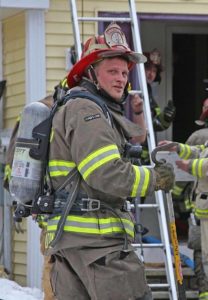What makes a leader?

The Volunteer and Call Fire Service is in serious trouble. With shrinking membership all around the United States, there is a need to re-evaluate how we manage our Department. With that, we all need to know how to present ourselves with a leadership mindset. It is important to stress that leaders don’t have to be exclusively Fire Officers and Chief Officers. Leaders can be anyone in the membership. In order to create a Department with a leadership mindset, we must be sure we understand what it means to be a leader, and not an average firefighter. Below, I have put together a list of some of the traits a Fire Service Leader should possess.
Read & study every day: Leaders strive to better themselves professionally and personally on a daily basis. Each day they want to be better than they were the day before. Fire service leaders not only study tactics for the fire service industry, but also read personal development books and business leadership books. What is often forgotten is running a fire department is much like running a business. Many aspects are the same. We have personnel and employees. We provide a service to the public. We need to balance a budget. We purchase equipment and capital items. We promote. The list can go on.
Work on personal development: It is recommended that we each take an hour of personal development each day. This could be done by reading, meditating, listening to podcasts, watching educational videos on YouTube or joining a mastermind. Leaders are constantly looking to better themselves each day, without wasting time watching TV.
None of us have it all figured out, and quite frankly we never will. If you believe you do know it all, you’ve placed yourself in a dangerous position for firefighting and for life itself.
Develop solutions: Every fire department has one thing in common, that being there are always problems that arise. Instead of complaining about the problems and barking to peers about what “should be done”, leaders address the problems with solutions. Nothing creates a toxic environment more that those who constantly complain about the issues and problems in our Department. We should step above that and work together as a team to create solutions. Leaders do just that.
Generate positive energy: With complaints and gossip comes negative energy. Negative energy can spread faster than a porch fire on a three-decker. Avoid that negativity by being the one to bring the positivity to your firehouse. In a day and age where the volunteer and call fire service is in trouble, we should be doing everything we can to create and environment where people want to join the ranks and stay. Leaders understand this.
Embrace the common goals of the Department:If you have been in your Department long enough, and even more so, if you’re a ranking officer, you know that the Department has a common goal that they are working toward. This common goal is often created and influenced by the leadership, being line officers and chiefs. Leaders embrace the goals, even if they don’t fully agree with them. Leaders know that it is a collective goal and that going around the backs of Department heads is not the way to handle things. Leaders know that if they disagree with a policy, action or a goal, it should be addressed face to face with the Department heads behind closed doors. Leaders also know that taking their complaints and disagreements to town or city hall will get them absolutely nowhere when it comes to moving up in rank.
Take personal responsibility for their actions: Leaders understand that everyone makes a mistake. Nobody is perfect and nobody knows everything. When a mistake is made, or when challenges were not met in an ideal manner, leaders take personal responsibility. Leaders don’t come up with excuses or pass blame on to their peers or the misfortunes of the Department (staffing levels, response distances, etc).
Motivate and inspire others: Two critical actions to entice new membership or to retain our current membership is motivation and inspiration. Leaders know they must motivate their peers in a positive manner. Positive motivation will breed incredible firefighters that want to attend every training, meeting, fundraiser and call for service. Leaders also know that in order to inspire and motivate others, they need to learn how to motivate themselves. Self motivation can be gained through adjusting your morning routines, eating a healthy diet and through an hour of personal development a day.
Provide value to their Department: The absolute most important thing a leader does is they provide value to their Department. Leaders don’t just show up and make an appearance. Leaders don’t just respond to the calls and put the fires out. Leaders bring more to the table. They start projects that will better their Department. They create training programs to build a more experience membership. Leaders are in tuned with their own selves and know what their strengths are, bringing all those strengths with them for the better of the Department.
This is just a few bullet points of what a Leader holds for values. Many more exist, such as giving gratitude, being in good health, possessing life experience to name a few. It is our duty as members of a Fire Department to be sure we are building ourselves personally and professionally to provide the best service to our members and our communities. I believe that if we all strive to be leaders and not average firefighters, we can accomplish that goal.
Be sure to subscribe to our podcast on iTunes.

Nick Hilton
Brotherhood Academy Radio
Instagram @nickhilton_bar